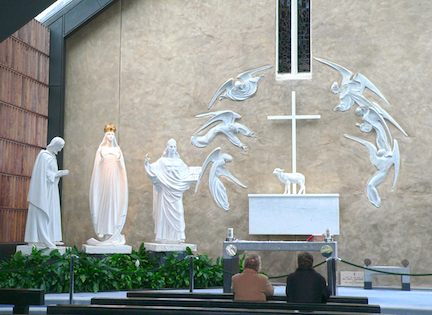Experiencing peace and joy at the Knock Shrine in Ireland


In 2008 I visited Ireland on business. My wife, Angie, and I took the opportunity to journey to the northwest part of Ireland and visit the small village of Knock. More specifically, we visited the Catholic Knock Shrine in County Mayo, a shrine previously visited by Pope John Paul II and Mother Teresa.
History
On the rainy evening of the 21st of August, 1879, at about 8 PM, Mary Byrne was going home with the priest's housekeeper, Mary McLoughlin. Byrne stopped suddenly when she saw something strange on the gable of their church. She claimed that she saw three life-size figures in front of it. Mary Byrne remarked to the priest’s housekeeper, “O, look at the statues. Why didn’t you tell me the priest had gotten new statues for the chapel?” But Mary McLoughlin said she’d heard nothing about them. On coming nearer, however, Mary Byrne said: “But they’re not statues, they’re moving. It’s the Blessed Virgin!” She ran home to tell her parents and soon others from the village gathered.
They saw images of the Blessed Virgin Mary, St. Joseph, and St. John the Baptist, who all appeared in a blaze of heavenly light at the south gable of the Church of St. John the Baptist. Behind them and a little to the left of St. John was a plain altar. On the altar there was an empty cross and a Lamb (Jesus Christ). Everyone in the scene was still and not saying any words, except for adoring angels that unceasingly circled the altar completely focused on the Lamb. The miraculous apparition was seen by 25 to 30 people whose ages ranged from six years to seventy-five and included men, women, teenagers and children. The apparition lasted for two hours. It was raining hard and the witnesses, drenched, got on their knees and prayed the Rosary. The ground by the apparition stayed dry. Different from other Marian apparitions, no verbal messages were given.
The witnesses described the Lamb as amazingly radiant, projecting a white light that was reflected by the other figures, with Mary reflecting the most light. The Lamb was peacefully and attentively looking at the other figures. Joseph had his hands together in prayer, his head bowed in respect, and he was looking at the Lamb. Mary was described as wearing a white cloak, hanging in full folds and fastened at the neck. She was described as "deep in prayer", with her eyes raised to heaven, her hands raised to the shoulders or a little higher, the palms inclined slightly to the shoulders. Everyone and everything was of white color, but Mary wore a brilliant golden crown. Over the forehead she wore a beautiful full-bloom golden rose. Next to Mary was St. John the Baptist. St John was dressed as a bishop wearing a mitre hat. On his left hand he is holding a large book (the Bible?) and it looks as if he was preaching.
An ecclesiastical commission interviewed all witnesses and its final verdict was that the testimony of all the witnesses taken as a whole was trustworthy and satisfactory. Another commission years later reached the same conclusion. What does this silent apparition mean?
Reflection
As soon as my wife Angie and I entered the chapel outside on the gable were the apparition took place, we were immediately bathed in the most wonderful feeling of peace and joy. It was as if we were hit by a lovely and peaceful wave. We then knelt in silent prayer and contemplation. Quietly we pondered the meaning of this apparition. I'm sure there are wonderfully deep theological interpretations that explore the significance of this event occurring not so many years after a million people died in Ireland during the potato famine and they suffered under English occupation. I’ll leave the deep interpretation to the scholars. Was this a silent gesture of love and solidarity with suffering and faithful people? The following is a personal reflection about what the apparition meant to me:
We live in such a wonderful life, and that life is even better knowing that our soul is eternal. After physical death we have an eternity to look forward to be in the presence of God. The empty cross the witnesses saw makes me think of the gift of resurrection that allows us to dream of a time in heaven worshiping our God.
“One thing I asked of the Lord, that will I seek after: to live in the house of the Lord all the days of my life, to behold the beauty of the Lord, and to inquire in his temple.”
— Psalm 27:4
I'm thankful for Jesus' redemptive suffering in the cross, for His dying for our sins, and for the daily sacrifice during mass. This event emphasizes the importance and power of the Sacrament of the Holy Eucharist, when we share and become one with Jesus, the sacrificial Lamb. "Behold the Lamb of God who takes away the sins of the world." "Blessed are we who are invited to the Lamb's Supper."
Mary and Joseph were seeing praying. This image reminds us to pray, pray, and pray without ceasing! Prayer of worship, thanksgiving, and intercession. They, along with St. John, communicate the power of the communion of saints. The souls in heaven, in the Purgatory, and here on Earth are all spiritually united and we pray for one another and in worship and thanksgiving to God. Mary and the saints intercede for us and our salvation. They bring us closer to Christ.
St. John motivates me to love, study, and pray the Bible and to confidently spread the good news of God's love for us and the salvation found through Jesus.
There have been many saints, I think Padre Pio was one, that often saw angels in church during the moment of Eucharistic consecration. I think of the angels rejoicing during every mass and I'm reminded that our guardian angels are with us and join us in adoration.
The apparition helps me think of the importance of family, as the entire family was there, including Jesus’ cousin St. John.
Finally, I reflect on the importance of making room in our lives for silence and contemplation so we may hear the whispers of the Holy Spirit. "Be still and know that I am God" (Psalm 46:10)




